In the College of Arts & Sciences, we are proud to celebrate our first-generation community through a collection of stories! We honor our students, alumni, faculty, and staff, and their many contributions to our university community and beyond.

Alshakim Nelson
As a faculty member, what does it mean to you to be a part of the first-generation community?
Being a part of the first-generation community is special to me because I was able to do what my parents and family before them never had the opportunity to do. Those achievements include going to college, getting a Ph.D. degree, and becoming a faculty member.
What insights would you share with current and future first-gen students?
Your education at the UW is an important gateway to opportunities and connections that you otherwise would not have. The people around you, including your professors, classmates, and mentors, may not look like you or share the same experiences as you, and that is okay. We are all a part of the same UW community. Connect with them to find ways to achieve your goals. Make the most of your time as a Husky.

Christine Harold
As a faculty member, what does it mean to you to be a part of the first-generation community?
I grew up in the Seattle area, and when I was sixteen my class took a field trip to Suzzallo Library. No one in my family had gone to college, and at the time I wasn’t preparing to either. I saw the beautiful building with its grand staircase, stained glass, and the students with their backpacks and books, and didn’t imagine such a magnificent place was for someone like me. Decades later, UW feels like home. My goal as a professor is to help all my students feel that same sense of belonging, and to foster a place where they can explore and flourish, no matter the path they took to get here.

Jazz Espiritu
Head of Program Affairs, Communication Leadership, Department of Communication
I can't speak about being first-generation without acknowledging my identity as a second-generation Filipino-American. My parents were the first to migrate to the U.S., and they brought with them the weight of our family's history and the responsibility of our legacy, all through their sacrifices. Unfortunately, that did not include how to "succeed" in college, or how to navigate many of the complex systems in place to achieve this "American dream". However, I believe my biggest strengths are in my first-generation identity.
I knew I was a first-generation college student during undergrad, but I didn't dive into how it impacted me until right before graduate school. It was years later when I realized that my struggles acclimating into college stemmed from being first-gen and not having a solid and reliable support system to guide me, leaving me overwhelmed and feeling incapable.
How did the experience as a first-generation college student impact your educational and career journey experience?
The world of college was incredibly overwhelming. For the longest time I was told to get good grades, and that would lead to success. While that worked well for me in high school, I struggled in college. It wasn't until years later I realized that this was because I needed more support. Still, I found my community in the Filipino-American Student Association at my university. The more involved I was, the more I became a leader in the club. I believe that club saved my college career, giving me the drive and encouragement to pursue a career in student affairs. I pursued a Masters in Education for Student Development Administration because I wanted to support students like me through their college journey.
As a staff member, what does it mean to you to be a part of the first-generation community?
In graduate school, we had chapters dedicated to the first-generation experience. There was a line that always stuck with me: "The first-generation college student becomes the first-generation professional." You bring the first-gen identity wherever you go. To be a part of the first-generation community as a staff member means I can feel safe asking the big questions, like who is this serving and why are we doing things a certain way. It means that my lack of navigational experience does not outweigh my thoughtfulness and strategic thinking. No matter the work that I'm doing, I consider the sense of belonging for the community I'm serving.
What insights would you share with current and future first-gen students?
You are the first to do this in your family's history, which means you are breaking from your family's traditions. I was entering unknown territory for everyone, and the more I understood that, the more comfortable I felt taking the lead of my own journey.
College is about embracing yourself as a learner, inside and outside of the classroom. Explore different classes, but also explore that intramural sport you've always wanted to try, or go to that club meeting you're shy about. Developing your skills as a community member and a leader are just as important as learning the content to your major. Try to come out of this as someone who is really good at LEARNING.
How has being a first-generation student influenced your interactions with students you work with?
Every student comes from their own unique experiences and background. I'm able to embrace everyone and meet my students where they're at.

Stanley Choi
Graduate Program Advisor, Department of Speech & Hearing Sciences
Alum – B.A. Communication, 2004
How did the experience as a first-generation college student impact your educational and career journey experience (what brought you to the UW/higher-education)?
My parents grew up in low-income households in Hong Kong and never had the opportunity to go to college due to how expensive it was. They always wanted their kids to go to college as they believed that knowledge was powerful and something that can never be taken from someone once obtained. My parents were right and they kept on encouraging us to learn through formal education but informally as well. When I found out I could work in higher education and be a positive influence, I knew I found my calling.
What insights would you share with current and future first-gen students?
You are not alone! There are UW students, staff and faculty who have been in similar shoes and were also the first in their families to go to college. It's okay to stumble as that is part of growth. Celebrate the wins! Be curious and embrace exploration!
How has being a first-generation student influenced your interactions with students you work with?
Having worked as an academic adviser for over 15 years, being first-gen is often an invisible identity. However, I've realized throughout the years, it's not possible to fully disconnect my identities when interacting with students. Whether it's talking to students about what it's like being the child of immigrant parents to talking about being the first in their family to work in a white-collar job, it's a privilege to share my story with students so they don't feel out of place at the UW.

John Macklin
Professor Emeritus, Chemistry
As a faculty member, what does it mean to you to be a part of the first-generation community?
It meant the possibility of encouraging students to consider a career in chemistry or other physical science and dissuading the stigma that the endeavor is difficult. I want students to believe that if I could do it, they could as well.
What insights would you share with current and future first-gen students?
The lack of familiarity most of us bring to the higher education academy is a detriment to successful navigation. I ask students to learn and share with fellow students and those who aspire to join the academy both course subject matter and the operation of the institution. Seek assistance if needed instead of struggling alone. Give assistance where possible. Knowing what you are getting into is important to success.

Rebecca Cummins
Professor, Art, Photo/Media + New Genres
I grew up in a tiny town in Iowa (pop. 401), the oldest of seven. Dad worked in a meatpacking plant and mom was the Avon lady. I was the first person on either side of my large, extended family to go to university — and I never left!
What insights would you share with current and future first-gen students?
While the academic environment can be overwhelming, especially initially, I encourage first-gen students to ask lots of questions, to develop community, to celebrate their accomplishments, and to value the unique contributions they will make from their specific perspectives and background. And to relish the experience and joy of being engaged in this special world of ideas.

Kelli Kirk
Human Resources Manager, Burke Museum of Natural History & Culture
Alum – B.A. American Ethnic Studies, 1996
How did the experience as a first-generation college student impact your educational and career journey experience?
I began my educational journey at Everett Community College. I grew up in Everett, in a working-class family. As I approached finishing my associate's degree, a guidance counselor encouraged me to apply to UW. I will never forget the feeling of opening that envelope, with the small purple script, "Offer of Admission." It felt like I won a lottery — and some days, it still does! As a UW student, I worked for Athletic Services tutoring Husky football players.
As a staff member, what does it mean to you to be a part of the first-generation community?
Being a first-gen means that I do not make assumptions about the support students might have or the struggle they face outside of school. When I meet a student here at the Burke Museum, or assist them in onboarding to work or study, it is in the back of my mind that they may be facing hurdles that are very difficult. Perhaps they are working full-time on a night shift, juggling several jobs to pay for a tiny room to rent, or caring for siblings or family members. Perhaps something in the back of their mind still questions if they have a place here. I have a placard on my door which identifies myself as a first-gen, so students can see that we are everywhere!
How has being a first-generation student influenced your interactions with students you work with?
I do not work directly with students as an HR Manager, but I do see them come by my desk as they begin their journey in the museum to work with scientists or researchers, or as part of work or work study. I will often explain terms rather than assuming that students know what these terms are — I remember being very discouraged once to see the term "matriculated" on a form, and I had no idea what that meant. So, I do not make assumptions about the body of knowledge a student arrives with. Also, being a first-gen for me is a tremendous gift. I have the gift of a wider, more inclusive perspective about what it means to be a college student or graduate, and an expansive idea of where first-gen people belong (everywhere!).
What insights would you share with current and future first-gen students?
This is for you too. I see you — you belong here. And when it's the hardest, it's important to remember that as first-gen students, we have a challenging path — but we also have an excellent toolkit in resilience and creativity. We bounce back faster — we are prepared to face setbacks with a stronger muscle in tenacity from our journey to get here.
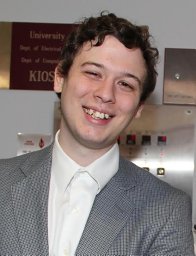
Chad Hoyer
Research Scientist, Department of Chemistry
How did your experience as a first-generation college student inspire/impact your research?
My first-gen experience has primarily impacted the development of my scientific communication skills. Due to prominent feelings of "I am too dumb to be here" and "I don't have the background to understand this" throughout my undergraduate experience, I find it intuitive to explain problems from different angles (e.g., less abstract or mathematical) and be sensitive to students who do not have a strong math background. Basically, I am not afraid to be super "handwavy." 😎
How did the experience as a first-generation college student impact your educational and career journey experience (what brought you to the UW/higher-education)?
To be completely honest, it made my journey more difficult due to ignorance of possible career paths. I told my high school guidance counselor that I wanted to help people and do something related to science. This resulted in a career path where I tried to be a physician's assistant, followed by a high school chemistry teacher, before finally pursuing a career in research.
What insights would you share with current and future first-generation students?
When you try to learn something new and the voice in your head says "you are too dumb to learn this," translate that into "I need to learn some background information before I can learn this."
Video: Chad Hoyer shares his unconventional journey to his current career in the Graduate School’s 2021 First-Gen Student Celebration.

Andrea Woody
Divisional Dean of the Social Sciences
Professor of Philosophy
Adjunct faculty in the Department of Dance; History; and Gender, Women & Sexuality Studies
I had a series of teachers in high school who talked with me about college and the possibilities it offered. They gave me permission to dream, and I started college full of enthusiasm. My experience, though, especially in the first year, included lots of fear, especially of failure. I worried about the money my family was spending on me. My two roommates, both from elite private school backgrounds, were comfortable talking in class, and one was such a beautiful writer that I was hugely intimidated. I was never sure I was handling assignments the right way. But I never asked questions.
In my own teaching, because of my experience, I try to give very explicit instructions for assignments, including examples of successful work, so that everyone knows what they are being asked to do. I also try to return graded work as soon as possible, because I know the anxiety of waiting for feedback when you’re not sure you did an assignment correctly. Implicit standards are a huge burden for first gen students.
I believe that education is the greatest social tool for liberation that we have. It allows you to discover both who you can be and who you want to be. It helps you achieve goals and have an impact on your communities. It’s the bedrock of good decision-making. That’s why I’ll never leave college.
Advice to students:
Learning is a communal experience. Talk, talk, talk to your classmates. Go to office hours. Ask questions. It gets easier the more you do it — I promise! Your experiences and thoughts are valuable; sharing them will help you understand that you are part of a community.
Don’t try to pre-plan your life! Try many things. Explore. Let your experiences reveal the path forward. [I had no idea I could/would be a college professor when I started as an undergraduate.
You belong here. This place will change you, and you will change it. I belong here, too, and I am forever grateful for the ways I’ve been changed by the students, staff, and faculty in my part of the UW community.
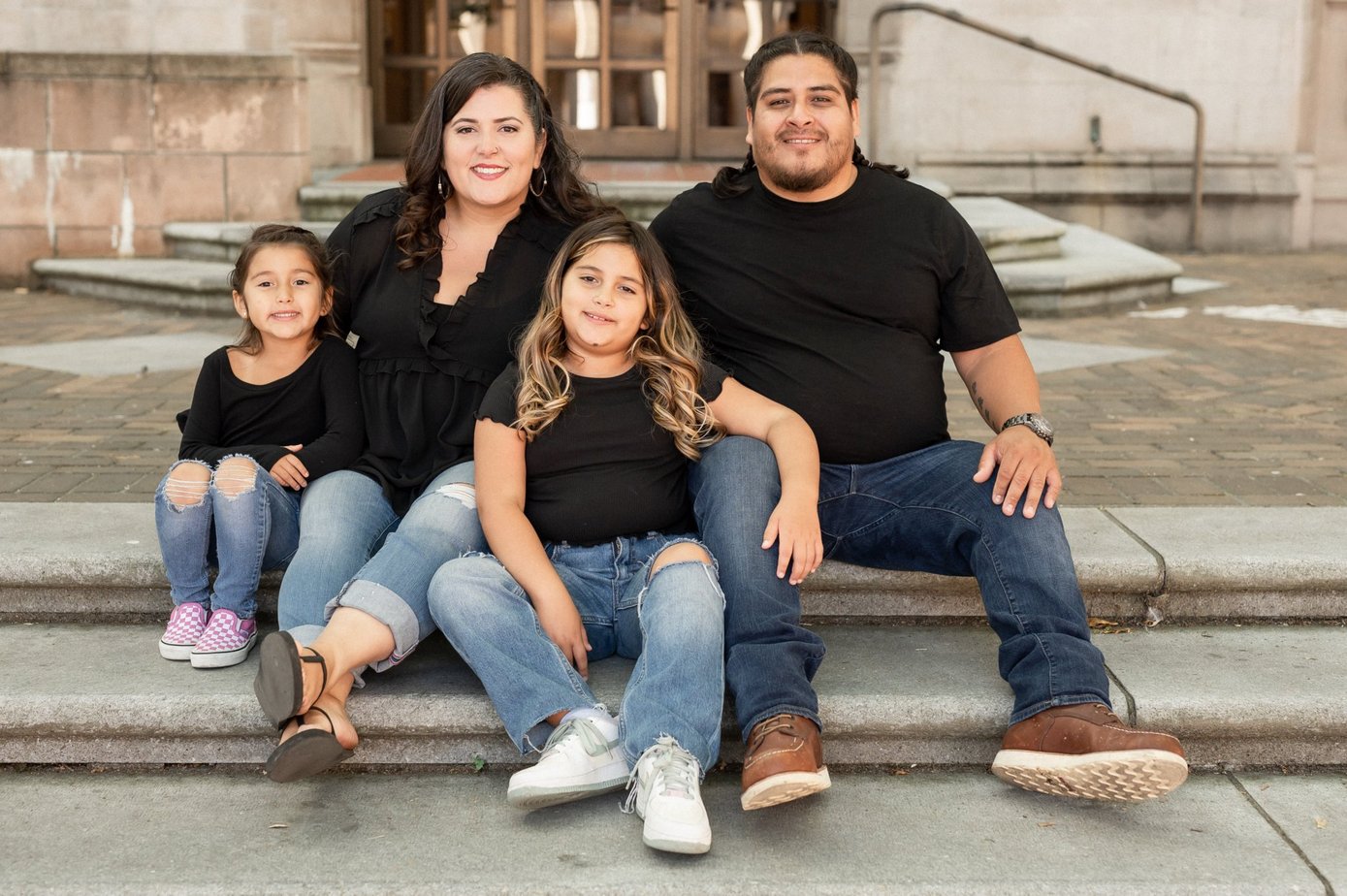
Andrea Pardo
Graduate Program Manager, Department of Biology
Alum, B.A., Comparative History of Ideas, 2006
As a staff member, what does it mean to you to be a part of the first-generation community?
Working as a staff member at the UW was the most logical next step in my journey and start of my career at the UW. As a transfer student, I was in a situation where I would not have been admitted to UW Seattle as a high school applicant. I needed that additional foundation at a community college to prepare me for the University and show the UW I was capable of academic achievement. After two years at the UW, I just felt like I wasn’t “done” — so being here, belonging and becoming a staff member means being an example and showing how the differences in a diversity of backgrounds is what strengthens our entire community here at the UW.
How has being a first-generation student influenced your interactions with students you work with?
Working with students is such a cool job, especially in an advising capacity. We are trusted with their stories and have the privilege to help shape their experience and education in our departments and programs. Coming from the first-generation and underserved population, I rely on my experience and it has influenced how I interact with students — to meet them where they are at and to celebrate the places they come from and the unique perspectives they bring.
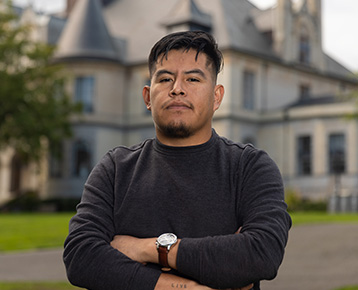
Leo Carmona
Media Relations Specialist, School of Art + Art History + Design
Alum – B.A. Psychology, 2016
Tell us a little about where you grew up and your route to get to college.
I was born and raised in Sola de Vega, Oaxaca, Mexico until I was 10 years old. I completed my K-12 education in Everett, Washington. I come from an immigrant family where higher education was not part of the conversation, so going to college was not something I aspired to. As an undocumented student with limited financial resources and college literacy, I did not contemplate college as a possibility until my senior year, thanks to incredible mentors. By the time I initiated the process of applying for scholarships, I had missed most admission deadlines for four-year universities, except for UW Bothell, where I had been accepted. I opted for community college first and received an associate degree from Everett Community College before transferring to the UW. It was the right decision for me as it was not only significantly more affordable, but it gave me time to prepare myself academically and have a better idea of where I wanted to go next.
How was your experience as a first-generation college student? And now as staff member, how does your first-gen experience inspire/impact your approach to work and connection to students/colleagues?
I’d describe my experience as transformative because everything was completely new to me — from living in a big city like Seattle, to navigating new spaces that had never been available to me, to dealing with the adversities but also the opportunities of being a college student at an institution like the University of Washington. I think that my experience as a first-gen really gave me an awareness of and empathy for the world around me that is reflected across all areas of my work. Since my college days, the concepts of social justice, cultural identity, diversity, and inclusion became fundamental aspects of how I approach my personal and professional life — from the stories I want/need to share, the communities I want to make an impact on, to voicing my ideas and concerns on practices that will improve the experiences and outcomes for all students, staff, and faculty.
What does it mean to you to be a first-generation college graduate and part of a growing community?
It means I get to be part of a group that is changing history. Being a first-generation college graduate is not solely about attaining a higher education degree and pursuing our own professional goals, it impacts many other aspects of our lives from access to different economic and network opportunities, to increased civic engagement, to fundamentally changing our outlook in life. Which translates to having the tools and possibilities to build different (hopefully healthier and more sustainable) kinds of relationships with our families, our finances, and our civic duties that can transcend generations.
What words of encouragement or insight would you share with current and future first-gen students?
If you feel uncomfortable, you’re doing something right. We evolve as much as we allow ourselves to, so I encourage first-generation students to situate yourself in new spaces that stretch your own understanding of yourself and allow for you to find out more of who you are and what you’re capable of. And if you make others uncomfortable, even better because then you’re having the world grow with you. It’s good to have a homebase, a safe space where you can return to ground yourself – perhaps a place or a person that will remind you who you are at core, and where you come from. But remember you don’t know what you don’t know, so mess around and find out.
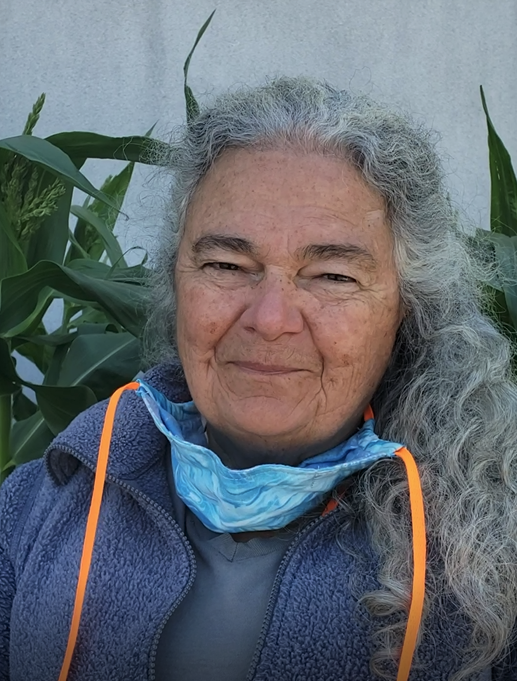
Jeanette M Bushnell
Faculty Instructor: Department of Comparative History of Ideas; Interdisciplinary Honors.
Alum, Ph.D., Women Studies, 2010; B.S.N., 1975; M.N., 1979
How did your experience as a first-generation college student, and now faculty member, inspire/impact your teaching, research, and connection to students?
I researched what I did not find in academia. I sought out scholars already in the academy who practiced pedagogies that were aligned with my philosophy and understanding of the world. With their work as a foundation, I have become more comfortable with the soundness of my own teaching/learning relationships and practices.
What insights would you share with current and future first-gen students?
Find someone on campus who you feel that you can trust to know you and your circumstances. Ask for their help to guide you through the system at every single step.
What brought you to the University of Washington?
I grew up in Olympia and the UW was my state school application. I started at Columbia University in New York City on my 18th birthday in 1970 but was quite overwhelmed and came home after one semester. I wanted to go into chemistry or engineering and UW had a good reputation for those areas of study.
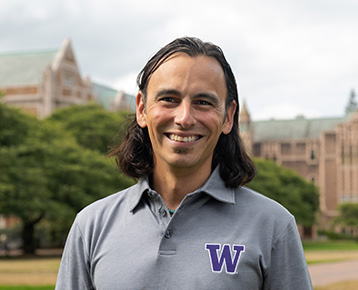
Jason Naranjo
Associate Teaching Professor, Department of Disability Studies
Tell us a little about yourself and your route to college.
I was born and raised in Oregon. I come from a family of artists, trades people, and folks who are deeply rooted in community. My route to college was not a clear one; however my family was and continues to be supportive of my education/work. As a first-gen student I started in the community college system and then transferred to the University of Oregon. Professors that I had at both the community colleges I attended and at the UO were instrumental in my sucess. They helped me to navigate the academy and opened opportunities that I did not know existed. They cleared barriers and we learned together. I am ever grateful for the faculty who lived their values of access and equity.
How was your experience as a first-generation college student? And now as faculty, how does your first-gen experience inspire your approach teaching and research, and your connection to students?
I found a home in the intellectual and creative spaces provided by the university. My faculty told me and showed be that I belonged. This is so important! Being first is not an easy go. In my teaching and scholarship, I actively work to show students that they belong and help them to realize that what they know, create, and embody are the keys to addressing the big questions and problems that are before us.
What brought you to the University of Washington?
The opportunity to create courses of study and scholarship that are a direct reflection of who I am as a teacher and researcher.
As a faculty member, what does it mean to you to be a part of the first-generation community?
It means being part of a community of teachers and scholars that removes barriers to full participation in the life of the University. It's about lifting one another and our students up.
What words of encouragement or insight would you share with current and future first-gen students?
You belong here. You belong here. You belong here. You belong here. Show up and work hard. Find community and always be willing to be there for others in the same way people have been there for you.
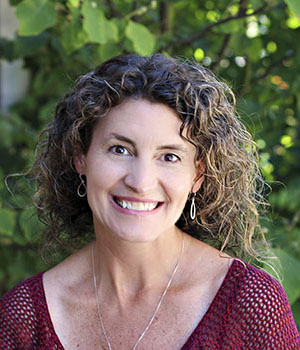
Kristie Spencer
Professor, Associate Chair, Graduate Program Coordinator; Department of Speech & Hearing Sciences
How did your experience as a first-generation college student, and now faculty member, inspire/impact your teaching, research, and connection to students?
I think the uncertainties I had as a first-generation student have shaped the way I interact as a professor. I try to humanize the classroom-- sharing personal anecdotes, normalizing my mistakes, infusing humor, etc. seem to help students feel more relaxed and empowered. I also remember how hesitant I was to ask a question or share my thoughts, so I try to keep that in mind and to create a safe space for all perspectives and questions.
As a faculty member, what does it mean to you to be a part of the first-generation community?
I wear my first-gen status as a badge of honor. It represents strength, courage, and tenacity. I welcome every opportunity to relay this message to first-gen students and to solidify the belief that they belong here, and the University is greatly enriched by their unique perspectives!
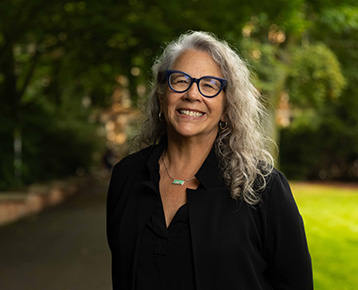
Andrea Otáñez
Teaching Professor, Department of Communication
Tell us a little about yourself and your route to get to college.
I got into college almost by accident. I grew up in Salt Lake City, Utah and had a pretty good public education — good in that it exposed me to all kinds of athletic and academic experiences and helped launch me as a journalist (school newspaper!). But when it came time to sign up for college, I just kind of rolled up to the University of Utah and asked a few questions and signed up. I had no idea how I was going to pay for it. I remember telling my dad: “Hey, I want to go to college.” And said, “You do?” He was so busy working two jobs and my mom working nights that they hadn't really put much thought into that next step. I leaned in the direction I wanted to go and then just kind of bushwhacked my way in, both academically and professionally. My parents were very proud and excited for me, and they helped me pay tuition, sometimes by borrowing from their parents. They always let me come home to live when the money got tight. So I did not do it alone!
How was your experience as a first-generation college student? And now as faculty, how does your first-gen experience inspire/impact your approach to teaching and research and your connection to students?
The labor of my hard-working parents — who helped me pay for my tuition and books — allowed me to be the optimistic undergrad who loved every second of being at a university. Basically, the university was a smorgasbord and I gorged myself, first as an undergrad and then as a grad student.
Everyday that I’m on our UW campus, I remember how exciting and complicated and fulfilling it was to be an undergraduate student. In my students, I see that enthusiasm and optimism (and exhaustion) and I seek to help them stay present in the intellectual, social, and global possibilities of an undergraduate education.
What brought you to the University of Washington?
Personally, my love of being in and around a university — fostered from Day One as an undergraduate student — has always brought me back to academia. I have worked as a journalist, an acquisitions editor for a university press, and a college instructor through the years, three pursuits grounded in my love of ideas and the written word. I was hired away from Everett Community College, where I was a tenured instructor of journalism and Chicano Studies, to teach journalism in the UW Communication Department, Seattle campus.
As a faculty member, what does it mean to you to be a part of the first-generation community?
Knowing someone is first-gen brings an important point of connection that even after all these years alleviates isolation. This connection may be with a fellow faculty or staff person, but also first-gen undergraduate and first-gen graduate students. (Being a first-gen graduate student was particularly challenging for me.) I always mention my first-gen identity on the first day of class so that students might feel more comfortable approaching me.
What words of encouragement or insight would you share with current and future first-gen students?
Accept your vulnerabilities and share them with good friends and mentors. Others are feeling the exact same way you are; you are not alone. Love who you are and find a good meditation app. If you get overwhelmed and stressed (like I do regularly!) breath deep and focus on the moment and what brings you joy. Belly up to the smorgasbord that is the UW!
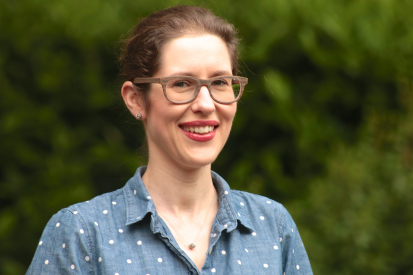
Annegret Oehme
Associate Professor, Department of German Studies
Tell us a little about yourself...where'd you grow up and go to school? What was your route to get to college like?
I grew up in a small town in Eastern Germany. Most of my family has lived there for generations. At first, I wasn’t even sure if I should go to college, but at every turn, I had people who encouraged me to take the next step, all the way up to a Ph.D.
How was your experience as a first-generation college student? And now as faculty, how does your first-gen experience inspire/impact your approach teaching, research, and connection to students?
My family was encouraging, but I had to figure out the specifics ranging from how to enroll in classes to how to finance my studies by myself, and I had to make some difficult decisions. But I was also privileged because I was able to finance my studies through jobs at the university and the German state’s student loan program, which you don’t completely pay back. While taking a leap of faith worked out well for me, I understand students sitting in my office who face difficult choices due to financial restrictions or family expectations.
As a faculty member, what does it mean to you to be a part of the first-generation community?
While it feels empowering because I had to work very hard (also as an international student and faculty), it still sometimes feels strange to be part of an academic community as a first-generation faculty because my family doesn’t completely grasp many aspects of my studies or my work as an academic. I have a wonderful community here at UW though, and in my department with great colleagues and a partner who also received a Ph.D. as a first-generation university graduate.
What brought you to the University of Washington?
My job. I was very lucky that this wonderful position was vacant when I graduated, and my department took a chance on a person who had just finished her Ph.D. I would have likely returned to Germany otherwise because I needed a job that could sponsor a visa.
What words of encouragement or insight would you share with current and future first-gen students?
Seek mentors and advisors whom you can trust and who also understand your situation. Ask questions if you are unsure about procedures, classes, or course of studies! Use the resources you have available. Don’t ever feel embarrassed for asking for advice or help! UW holds many resources and nobody wants to see you fail!
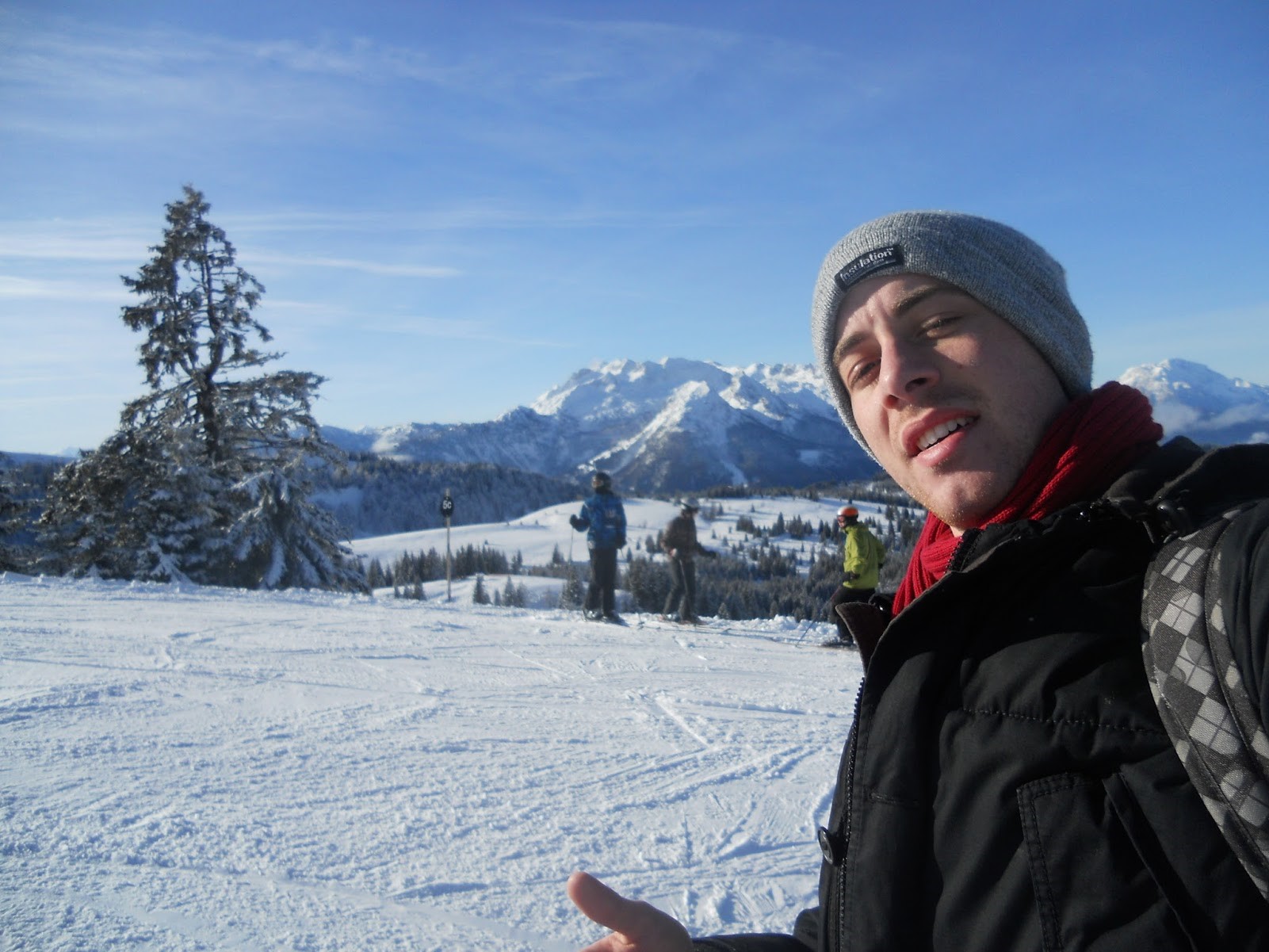
Stefan Steinerberger
Associate Professor, Department of Mathematics
How did your experience as a first-generation college student, and now faculty member, inspire/impact your teaching, research, and connection to students?
It helps me maintain an appreciation for the fact that the academic system can be a rather confusing labyrinth. If you don't know which way things are headed, you should try and find out — but of course it's not always so easy to even recognize that one is lost in the first place.
What insights would you share with current and future first-gen students?
Find a sympathetic faculty member and start asking questions. How should you design your major? How do you go about realizing your goals or what's the best way to clarify to yourself what your goals are? You don't know what you don't know — it's very, very easy to make mistakes that will have you miss out on opportunities without even realizing it!
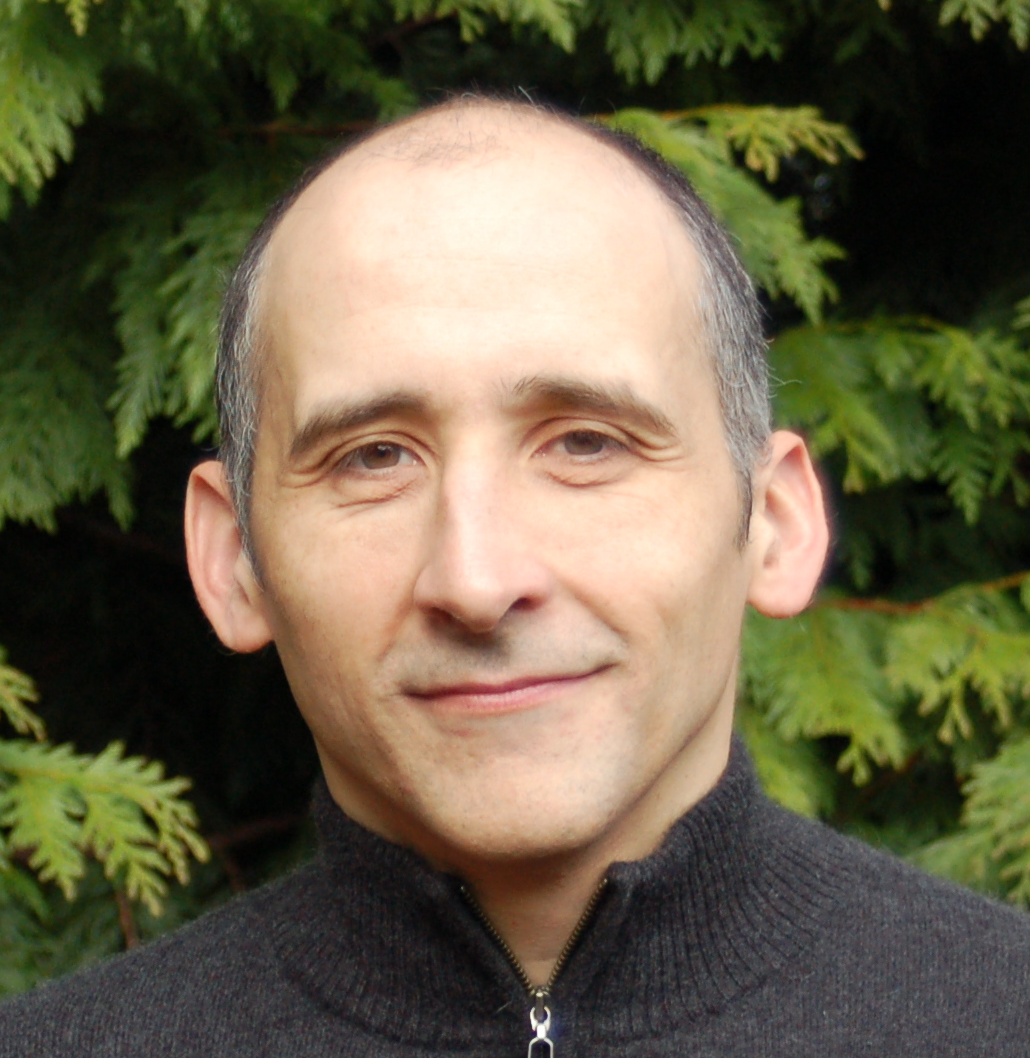
Sándor Kovács
Professor, Department of Mathematics
How did your experience as a first-generation college student, and now faculty member, inspire/impact your teaching, research, and connection to students?
My family could not provide me with information on what it means to be a university student, so I had to figure it out myself. It is a huge change going from high school to university. In the end, I viewed my experience as something that gave me an edge. I learned to solve problems and figure out answers as I needed them and this gave me strength and self-confidence.
What insights would you share with current and future first-gen students?
When I was in college, since my family could not provide guidance, I took it for granted that I was on my own and I had to figure out everything without asking for help. It did not occur to me that I could ask faculty, staff members, or more advanced students for guidance. So, this is what I would tell current and future first-gen students: You are not alone and there are many people who will be happy to help you. Just ask. No one expects you to have all the answers. The University is a community of learners. We help each other whenever we can.
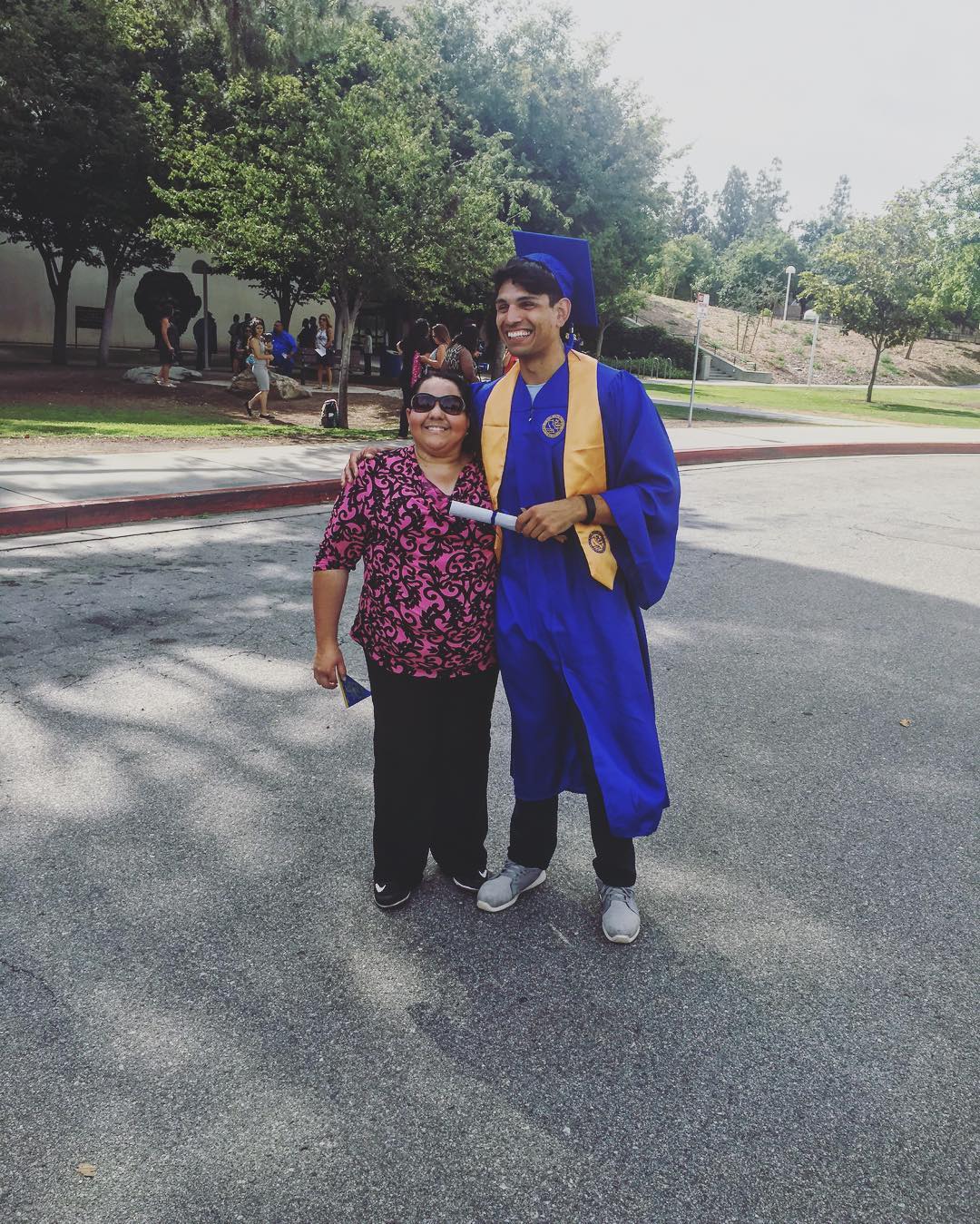
Juan Rodriguez
Marketing Production Specialist, College of Arts & Sciences
First-Generation Storytelling Celebration Collaborator
How did the experience as a first-generation college student impact your career journey experience?
My first-gen experience was filled with countless unknowns and moments of despair, where it felt like dropping out would be the best option (particularly after my first semester of undergrad going terribly wrong). Luckily, with much needed encouragement from my mom, I didn't give up, and because of that decision, I was able to enjoy a college experience that provided opportunities to discover unknown passions, forge lifelong friendships, and understand how important it is to utilize failures as the greatest teaching moments. The feeling or experience of being a first-gen college student is something that I don't feel will ever fade entirely from my life as I carry dreams that will continue requiring the exploration of unchartered waters that no one in my family ever has gone through — and that to me is very exciting. I can say with certainty that without the college experience, I would lack both the courage and belief to even pursue what gets my heart beating faster. Coming to the UW as a staff member was the next chapter in that for me because it's a special place where I can explore, nurture and take the next evolution of actions to get me closer to the storyteller I aim to be.
What is your reaction to seeing all of these stories in the First-Generation Storytelling Celebration together?
Seeing all the stories from the College of Arts & Sciences come together and be hosted on our website that will continue to see further installments over the coming years is a beautiful thing to be a part of. As the photographer on the team, I had the chance to meet over a dozen of our first-gen heroes featured here, and just having the opportunity to connect with them for a few moments during phone calls and eventual photoshoots is something I won't ever forget. It really has been an inspiring endeavor, and I feel that our campus community will also have some inspirational takeaways from the stories we've chosen to share here. We all see a piece of ourselves in each of our unique stories, and we can all take this space to celebrate each other for the courage, determination and special bond we share.
What would you say about working on the College of Arts & Sciences First-Generation Storytelling Celebration?
I'd like to plug in a call-to-action here...share your first-gen story with us. This really is a special project to be part of and I'm excited to see how it evolves in future iterations.
What insights would you share with current and future first-gen students?
There are going to be many days where it doesn't seem to make sense, and that is an incredibly vulnerable space to maneuver. Just know that you belong here at this incredible university and in every great opportunity you come across in your journey. It's okay to not have the answers or to not feel entirely comfortable in new spaces you'll find yourself in. Use curiosity to your advantage and ask questions, read for fun beyond the classroom, listen to new music that makes you want to bop around, or take a walk, and look for chances to join student organizations. Curiosity is a great tool in the classroom, and it will also serve you well beyond the University of Washington. Give it your all because you'll get back what you put in.
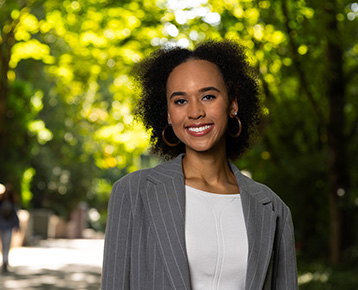
Tiana Cole
Program Administrator, UW Continuum College
Alum – B.A. Journalism and Public Interest Communications (Department of Communication), 2021
Tell us a little about yourself and your route to get to college.
I grew up in Olympia, WA and attended Tumwater High School. I set my sights on going to college early on and attended a conference for Black students at the University of Washington that solidified the UW as my dream school. Throughout high school, I was involved in sports and various extracurriculars that provided me the opportunity to find mentors who encouraged me to challenge myself and reach my goals. One of the most valuable organizations I was a part of throughout my childhood was the 4-H program where I developed leadership skills, discovered the importance of civic engagement, and gave back to the community through service. I spent most of my free time showing horses and cultivated patience, resilience, and determination through the sport, traits that helped me be successful in college.
How was your experience as a first-generation college student? And now as staff member, how does your first-gen experience inspire/impact your approach to work and connection to students/colleagues?
My freshman year presented a lot of changes, from navigating a new city to balancing work with school and finding community. I was a part of a program for minority and first-generation students called the Educational Opportunity Program (EOP) that provided me with the structural supports I needed to thrive at the UW — tutoring services, study skills, connecting me to campus resources to access scholarships and career guidance. I majored in journalism and found that it was fulfilling to amplify the voices of those from marginalized communities, which led me to get involved in advocacy work at the UW to further DEI efforts on campus. My first-gen experience impacts how I approach my work as a staff member by finding ways to address and dismantle systemic inequities to ensure that students from disadvantaged backgrounds can access higher education. I am passionate about furthering representation in higher ed so that students can see themselves in the spaces they occupy.
What does it mean to you to be a first-generation college graduate and part of a growing community?
Being a first-generation graduate is meaningful to me because it represents an accomplishment in my life that was once not attainable for my ancestors. My college experience gave me an opportunity to find my voice and understand the ways that I can cast my influence to positively impact and uplift others. I believe that first-generation college students and graduates bring unique insight that can transform our communities to become stronger, healthier, and more equitable. It is rewarding to be a part of a community that is creating pathways for others to follow behind, while also contributing to inspiring others that adversity can lead to unveiling our innate qualities and passions.
What words of encouragement or insight would you share with current and future first-gen students?
Your journey is unique, on its own timeline, and should not be compared with others. If you find yourself inclined to pursue a dream despite the uncertainty it might bring, then you absolutely must go for it. Avoid making decisions based on the opinions of others or out of fear because only you know your full capabilities.
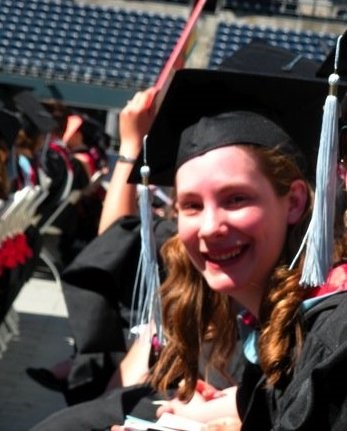
Heather Werckle
Assistant Director of Academic Services, Communication Leadership, Department of Communication
How has your experience as a first-generation college student influenced your approach to work and your connection to students and colleagues?
Having navigated applying to college, transferring to a different four-year school to finish my undergraduate degree, and then earning multiple graduate degrees, all by myself with no family knowledge to guide me, I became very skilled at learning and negotiating the ins and outs of university policies and procedures. This segued perfectly into a career in student affairs, where I use those skills and knowledge to help students on their own educational journeys every day. I don’t want other students to have to “figure it out as they go” like I did and suffer some of the same mistakes I made, so I try to build in as much support as I can to make sure they don’t get tripped up by complex processes.
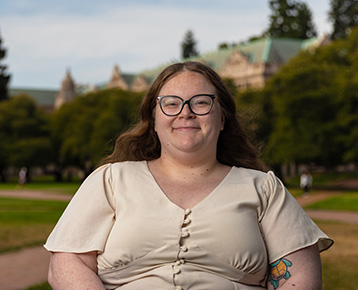
Sariah Burdett
Program Coordinator, Department of French & Italian Studies
Alum – B.A. History, Korean, and Asian Languages & Cultures, 2022
Tell us a little about yourself and your route to get to college.
I grew up in Rochester, WA and graduated from Rochester High School in 2018. Rochester is a very small and rural town so there wasn’t too much of a focus on going to college from my school district. My parents had always encouraged me to go to college but as an Autistic kid from the middle of nowhere, I thought I wouldn’t be able to succeed in higher education and was destined for a small-town life. It wasn’t until Mr. Sugitan, my 10th grade English teacher, pushed the class to consider college and took our class on a field trip to UW that I could see myself succeeding in a big university like UW. Thanks to his encouragement, I dedicated myself to going to a university, preferably UW.
How was your experience as a first-generation college student? And now as staff member, how does your first-gen experience inspire/impact your approach to work and connection to students/colleagues?
I came to the UW in 2018 and graduated in 2022 as a history honors, Korean, and Asian languages & cultures triple major. For me, coming to UW made me the person that I am today. I was given opportunity to pursue a rigorous education that wasn’t available back home, I became more independent living on my own in a big city, and was able to make a community for myself. My first-gen experience gave me a lifelong passion for education, and now that I am a staff member in French & Italian Studies, it impacts my approach to working with colleagues, students, and my community at large. I understand that opportunity and privilege influence how people interact with their workplace, their school, etc. and my first-gen experience allows me to understand and aid a larger community than before.
What does it mean to you to be a first-generation college graduate and now part of a growing community?
Being a first-generation college graduate has provided me as an individual with an opportunity to become a better version of myself, whether it was through the education I received or the skills I developed. I now have the opportunity to repay my community, my parents, and my educators for the push they gave me by being somebody who supports others on their own paths.
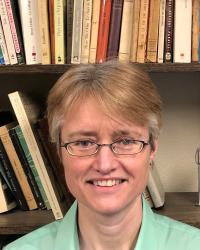
Louisa Mackenzie
Associate Professor, Department of Comparative History of Ideas
As a faculty member, what does it mean to you to be a part of the first-generation community?
Mostly, it's just comforting to meet others who have navigated similar obstacles. In terms of professional norms, knowledge, and expectations, I feel like it's taken me a few decades to catch up with my colleagues for whom higher education, and professional identity in general, was modeled in the family. Just the mechanics of an academic career, like applying to grad school, or even knowing the difference between an MA and a PhD, were all things I had to learn as I did them. When I started at the UW, a colleague asked me to name my favorite opera, and I had to admit I'd never been to the opera ... I could see this person's esteem for me plummeting! More awareness of first-gen and class difference has meant that this kind of encounter is less frequent these days. Starting a life in an expensive city with no generational wealth was another challenge. Sometimes, our professional norms assume that we live close to campus and can easily pop in for meetings; I can't afford to live in Seattle so I waste a lot of time on public transit and/or looking for free places to park in the U-District. First-gen colleagues understand those things implicitly and are more likely to be willing to work with my commute woes. I also understand students who have long commutes, and who just can't make it to class sometimes, so I try to build in some flexibiity to my classes, like a one-week "free pass" for absences.
What brought you to the University of Washington?
A job offer in my field, on the tenure track, right out of graduate school! This has become the holy grail of academia these days. I was incredibly lucky.
More Stories

Finding Love at the UW
They met and fell in love as UW students. Here, 10 alumni couples share how they met, their favorite spots on campus, and what the UW still means to them.

What Students Really Think about AI
Arts & Sciences weigh in on their own use of AI and what they see as the benefits and drawbacks of AI use in undergraduate education more broadly.

AI in the Classroom? For Faculty, It's Complicated
Three College of Arts & Sciences professors discuss the impact of AI on their teaching and on student learning. The consensus? It’s complicated.
